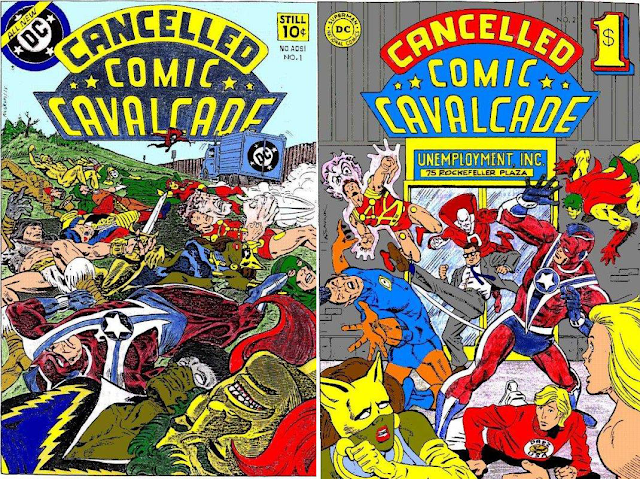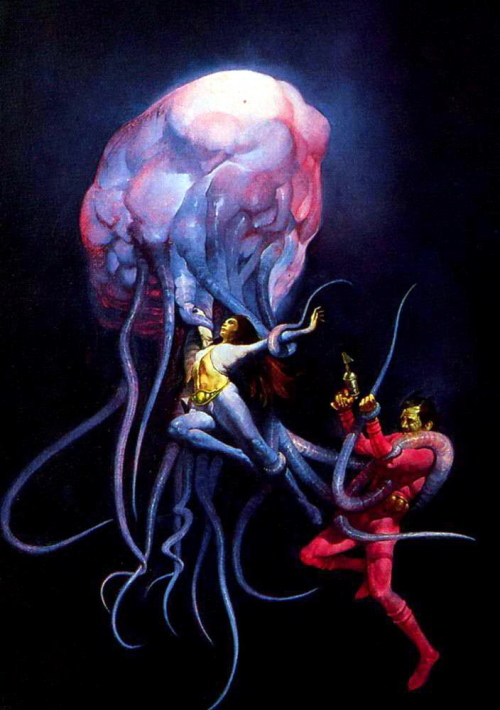T
he original of this post appeared in 2014.
It's not an uncommon complaint on the internet that the Elemental Planes are boring because they're featureless expanses of the same thingm, which is sort of like saying dungeons are boring because thy're just empty spaces underground, or wilderness adventures are dullsville because it's just a whole bunch of trees. Most environments are probably not in and of themselves terribly interesting. They're interesting because of (a) what you can put in them and (b) the additional challenges their nature presents to PCs. I would also say that the Elemental Planes can be an interesting cosmological element in a setting even if not viewed as a place to go adventuring, but it's "place for adventuring" I'm going to focus on here.
First off, the Elemental Planes as typically described are for the most part pretty hostile to human life. I don't think that's a bad thing, necessarily. High level adventurers have access to a lot of great technology (i.e. magic) to protect themselves. Guarding against equipment failure and avoiding changing conditions certainly creates a lot of tension in science fiction books and movies; there's no reason it can't be put to similar effect in gaming. It's resource management that's more than just counting.
Here are some brief ideas and inspirations for Elemental Plane adventures:
Air
This one's probably the easiest, with flying creatures, cities on clouds and the like. I would draw some inspiration from sci-fi imaginings of life in the atmosphere of gas giants. The plane of air should only be featureless like space is featureless: there should be pieces of stuff falling/tumbling through it. There should be air-dwelling Portuguese man o' war type things and air-whales like living zeppelins that one can travel or even live on. Reliance on the strongest air streams for travel would ensure that there were certain air caravan routes.
Inspirations: the Cloud City of Bespin in
The Empire Strikes Back, the
Star Trek episode "The Cloud-Miners,"
The Mysterious Explorations of Jasper Morello,
Castle in the Sky (1986),
Last Exile.
Fire
Fire is like a really big star, though it's surface is much cool. There would be islands of rock (and by islands, I mean things bigger that continents) floating across it, or great metal craft drifting through it's smoke-choked corona. It would, of course, be populated (though perhaps not exclusively) by beings (jinn?) composed of Fire who did very similar stuff to Prime Material humans but were fiery while doing it.
Inspirations: Any
Adventure Time episode dealing with the Fire Kingdom, the neutron star life of Forward's
Dragon's Egg, parts of
Sunshine (2007),
Secrets of the Fire Sea by Stephen Hunt.
Earth
This plane is a huge sphere (or block or tesseract, or whatever) of rock, riddled with tunnels and chambers. In other words, it's a dungeon in three dimensions. It's sci-fi asteroid mining and molerat sapients, too.
Inspirations:
Dig Dug, the Star Trek episode "Devil in the Dark,"
Derinkuyu.
Water
Like Air, it's fairly easy to see what to put into the Plane of Water, but maybe difficult to see why you wouldn't just do that stuff on a Prime Material ocean. I would say it's like an extraterrestrial
ocean planet: You can make it far more exotic than you would the oceans of your main campaign world. Societies would have vertical and horizontal borders. Different depth layers would be like different levels of a dungeon, except (depending on how science fictional you got) adventurers might need increasing pressure protection to descend to the next level.
Inspirations: Neptune's Brood by Charles Stross, The Abyss (1989),
Finding Nemo,
20,000 Leagues Under the Sea,
Blue Submarine No. 6, Sub-Mariner, Aquaman, and
Abe Sapien comics.
























